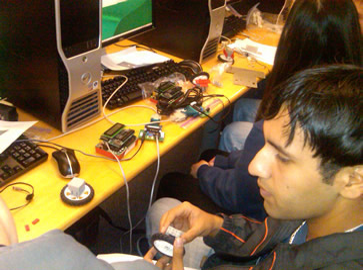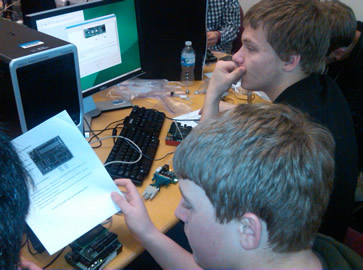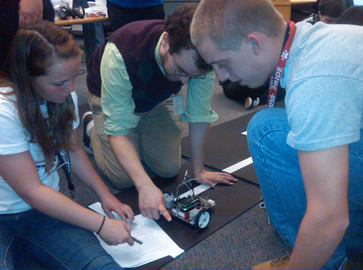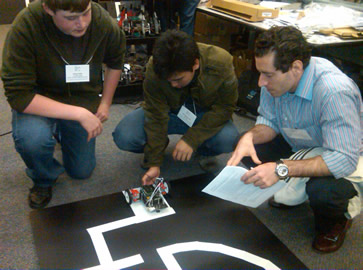VT CEED C-Tech2
Outreach to K-12 community through C-Tech2 workshops
RML participates in the Computers and Technology at Virginia Tech (C-Tech2), the pre-college STEM program for rising high school junior and senior girls. In summer 2017, the lab provided over a period of four days (June 28-July 3), four 3.5-hour workshops titled “Introduction to Robotics at Virginia Tech,” intended to provide a foundation in the terminology and the math that forms the building blocks of robotics. The sessions were a combination of short lectures as well as hands-on activities in order to both teach as well as demonstrate many of the modern core principles utilized in the field of robotics. The lectures touched on a wide range of topics, such as how to determine a robot’s degrees of freedom, the manner in which geometry drives robot kinematics, where/why haptic feedback is implemented, and the science behind computer vision. Experiments and demos were conducted using several robots.
GW's Science, Technology and Engineering Day
Outreach to K-12 community through Technology workshops
Every April, during the period 2011-2015, as part of the national robotics week, RML has been offering a robotics workshop for Loudon County high school students as part of GW's Science, Technology and Engineering Day at the Virginia Science and Technology Campus.
Titled "Greater than the Sum of its Parts: Integrating a Robotic System," the session focused on how the design of robotic systems is dependent on the integration of its mechanical, electrical, control and computer subsystems. After a short briefing and demonstration of some robots built in Prof. Ben-Tzvi's Robotics and Mechatronics Lab, the students paired up and began working to create their own robot. In addition to attaching sensors, actuators and other mechanical components to a frame, students learned how to interface with a microcontroller and adjust program parameters to influence their robots' operation.
Beyond putting together the parts and downloading a pre-programmed code, the students were required to adjust their program based on their own experimentation, mimicking the real-world challenges faced by roboticists every day. Specifically, students were required to characterize their infrared sensors’ analog output values and choose motor speeds to allow for optimum operation. At the end of the session, several teams tested their robots, successfully following lines and avoiding obstacles within a maze.
Prof. Ben-Tzvi is assisted in running the sessions by his doctoral students. Media covering some of the workshops and the event included PBS News Hour Extra, the Loudon Times Mirror and Leesburg Today. Sample articles are available at:
Science, Tech & Eng. Day Gallery




